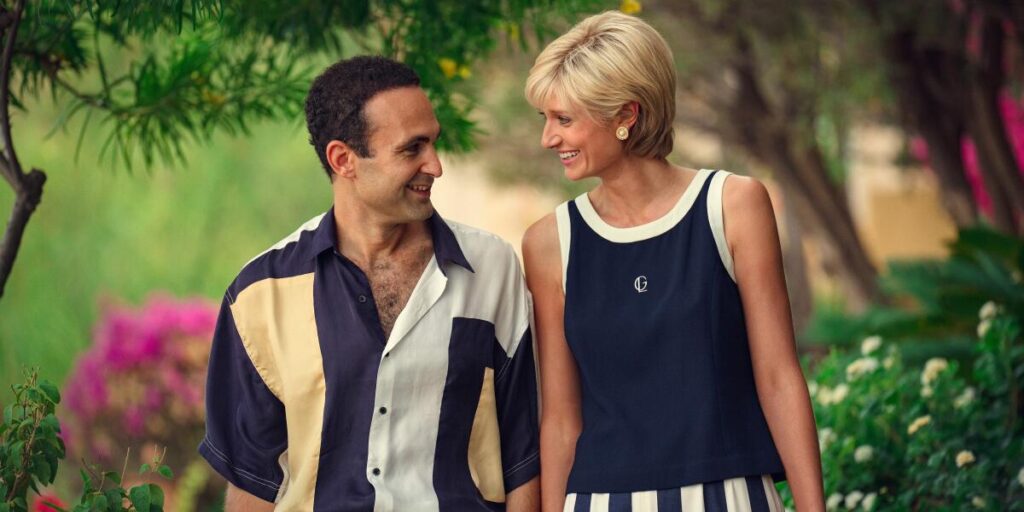In “The Crown’s” fifth season, Elizabeth Debicki took over the role of Princess Diana from Emma Corrin, earning an Emmy nod for her portrayal. In Season 6, she returned to the story with the added challenge of playing the People’s Princess in the last weeks of her life. Debicki’s luminous, sensitive work has been recognized with Golden Globe and Critics Choice awards, and she and the ensemble also garnered SAG nominations.
In her two acceptance speeches so far, Debicki thanked her “beautiful pretend children” (Rufus Kampa as William and Fflyn Edwards as Harry), as well as her scene partner Khalid Abdalla, who played Dodi Fayed. “If I did anything good in this show, you are half of it,” she told him. She also noted that the role was both “a gift” and a “terrifying challenge.”
On a Zoom chat from Paris, Debicki elucidates further. “I’ve found as I get older, very good things usually come in that funny package. The thing that’s good for you is often the thing that is daunting.” She had said yes to the role immediately, instinctively, “and then a wave of layers of reasoning started to trickle in, and I found myself feeling like I was in a crossroads, in the sense that it’s going to go in one of two ways: You’re going to be able to do it well or you won’t. Either way, it’s going to be polarizing.”
The final season’s first four episodes focus on Diana, her children, her relationship with Fayed and their tragic end. In Debicki’s first scene back from hiatus, she had to sneak into William’s bedroom and wake him up to go on holiday. She was grateful for the gentle reentry. “I felt this strange muscle memory spring back into my body. I was standing in the hallway, someone said, ‘Action,’ and I creaked the door open, and felt, it’s there, it’s just there, and that was lovely. I could ad lib those two scenes with the boys when I wake them up. And they are super kids, really free and funny. I used to feel very bereft when I didn’t have them on set.”
Her greatest challenge was not letting her character portray what the actor knew. “When I read the scripts, I was devastated. That’s the time I let myself really feel it. Then I had to learn how to play against it, and in that respect, I had Khalid Abdalla as a scene partner. We were very strategic and strongly intertwined in our collaborative process in terms of what is it important to show, because we come to the story with so much prior knowledge, with conceptual ideas of that relationship.”
Princess Diana’s (played by Elizabeth Debicki) relationship with Dodi Fayed (played by Khalid Abdalla) was key to Season 6.
(Daniel Escale / Netflix)
They focused on staying in the moment. “There’s enormous complexity there and questions we’ll never know the answers to, that’s not our job to know the answers, so we have to look at these photographs, listen to these people tell us things. And we gleaned that there was at times enormous joy, and much generosity.” Her character had a clear intention throughout: “To get to the children, to get to the phone call, to get back home.”
She and Abdalla would be back in the makeup truck after shooting when the sorrow of their characters’ fates would hit them. “I would look over, and he’d say, ‘Oh, are you feeling that?’ and I’d say ‘Yup it’s coming,’ because we understood what we were putting into the world, and it felt like a deep responsibility to do it as compassionately as we could.”
Creator Peter Morgan crafted scenes after Diana’s death in which she visits with Prince Charles (Dominic West), and later with Queen Elizabeth (Imelda Staunton). Debicki and West shot their scene the day after the “Crown” troupe celebrated the premiere of Season 5. “Neither of us quite knew how to do it,” she recalls. “Our director, Christian Schwochow, said, ‘Let’s shoot this like a conversation.’ We didn’t rehearse it, we just rolled the camera.”
The scene tapped into a universal experience of grief. “You think, ‘I need to speak to that person. I understand what’s happened, but let me just speak to that person.’” The actors’ own feelings of grief grew as they worked. “Dom is really beautiful in that season, but particularly all the work in Episode 4, I found it staggeringly good acting. Sitting opposite him was so powerful, he really made me cry.”
After wrapping, she made a movie with Ti West called “MaXXXine,” “a very different kind of filmmaking that’s much faster and less reverential in tone.” But she isn’t sure what comes next. “I’ve never experienced this kind of trajectory during a role, and how satisfying that can be,” she says of playing Diana over two seasons. “It was so stimulating creatively, it’s a hard act to follow.”

